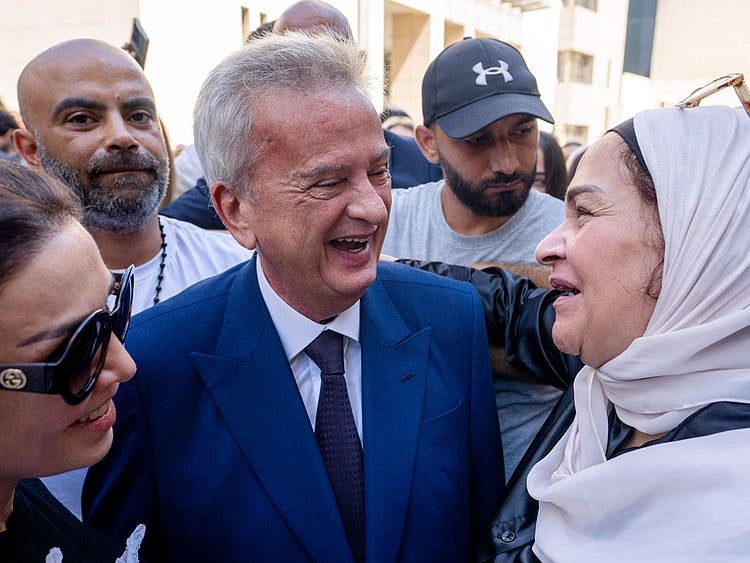What’s next for Lebanon’s Riad Salameh, after retirement?
Acclaimed central bank governor of the 1990s is now blamed for the banking sector collapse

Lebanon’s central bank governor Riad Salameh was all smiles as he walked out of his office on July 31, 2023, chomping on a cigar. Bank employees saw him off with cheers, tears, and music, raising the ire of many who solely blame him for the thundering collapse of the Lebanese banking sector, which sent thousands of people into financial ruin and bankruptcy.
Thirty years as bank governor
Salameh has been at his job since 1993. But it wasn’t always bad for the 73-year-old economist, appointed by Lebanon’s former prime minister Rafiq Al Hariri, two years after the end of the civil war. After a successful career with Merrill Lynch, Salameh was handed Lebanon’s top banking job to rebuild the war-torn country, restore confidence in the local currency and attract deposits from the Lebanese diaspora and wealthy Arabs.
He did just that for two decades, offering high interest on dollar deposits while pegging the Lebanese pound at 1,500 to the US dollar. During the relative stability of the 1990s, it seemed like the logical thing to do, earning him praise at home and international acclaim. Some in Lebanon went as far as to compare him to Alan Greenspan, then-chairman of the Federal Reserve in the US.
The beginning of the end
Then came the Arab Spring of 2010-2011, which while toppling regimes across the region, dried up foreign investment in Lebanon. The country found itself at daggers-end with Saudi Arabia and, with the influx of Syrian refugees, began to spend more than it was earning, prompting Salameh to raise the interest rate on American dollars without consulting either parliament or the Lebanese government.
Things collapsed with the outbreak of the October Revolution of 2019, launched against then-president Michel Aoun and his son-in-law and designated heir Gibran Bassil. As the banking sector crumbled, so did the lira — almost overnight. Within a year, GDP had contracted by 40 per cent, and depositors were locked out of their dollar accounts, sparking outrage throughout the country. As if that was not enough, the COVID-19 lockdown of 2020 came, followed by the August port explosion in Beirut, which tore down half the city and killed over 220 people.
At the end of the day, it was the Lebanese people who suffered from these back-to-back disasters, along with the Lebanese economy. Salameh leaves office today with financial loss at the Central Bank estimated at $72 billion and the Lebanese pound trading at 100,000 to the US dollar. In an interview with the Lebanese channel LBCI days before leaving office, Salameh insisted that he was not responsible for what happened, blaming it entirely on the Lebanese government.
Lebanese accountability
Lebanese prosecutors filed a lawsuit against him in 2020, which has since picked up steam and spread to Belgium, France, Germany, Luxemburg, and Switzerland. Salameh is accused, among other things, of embezzlement, illicit financial gain, nepotism, money laundering, and fraud. Two arrest warrants have been issued by Interpol, and yet, so long as he remains in Lebanon and doesn’t travel abroad, Salameh will be sheltered from arrest.
Elias Sarkis and Carlos Ghosn
What will happen to the ex-governor next? Despite a hostile wider public, he still has friends among the country’s political elite, including Prime Minister Najib Mikati and Parliament Speaker Nabih Berri. When one of the Lebanese judges tried to bring him to court, she was accused of bias and replaced last May. That speaks volumes about Lebanon’s political system and the independence of its judiciary.
As recently as mid-July 2023, Berri had floated the idea of extending Salameh’s term to avoid a vacuum at the Central Bank. He suggested a six-month extension or naming Salameh as shadow adviser to the bank. That however would have required amending a 1963 law that restricts the extension of the governor’s term to six full years, with no provision for anything shorter.
Additionally, Prime Minister Mikati is constitutionally incapable, given that he is heading a caretaker government, of signing off a decree on whether to extend Salameh’s tenure or appoint a successor. His successor Wasim Al Mansour is also one of his four deputies and, thus, doesn’t require the signature of the premier.
Also Read
Military Takeover: Niger’s future hangs in the balanceArt for Humanity: A wholesome blend of devotion, creativity, and peaceFrom Solitude to Survival: The enchanting world of a marsh girlTaliban to Afghan women: Your beauty salons gotta goBanking aside, Salameh can always venture into politics like other senior technocrats before him. One of his predecessors Elias Sarkis even became president in 1976 after nine years at the Central Bank of Lebanon. He had none of Salameh’s baggage, but in Lebanon and by virtue of how Salameh was bid farewell at the bank — anything can happen.
Or he can live a comfortable life in retirement, enjoying his millions, like his compatriot Carlos Ghosn, the former CEO of Nissan Motors who fled jail in Japan and has been living comfortably in Lebanon since 2019. Like Salameh, Ghosn was once hailed as a titan in the world of business, a legendary entrepreneur and visionary wizard before his career came to a sudden and very unexpected end. Both men are wanted by Interpol, and both are seemingly immune from arrest or deportation, thanks to their connections in the upper echelons of power. If Ghosn gets red carpet treatment wherever he goes in Lebanon, then probably, so would Salameh.
— Sami Moubayed is a historian and former Carnegie scholar. He is also author of Under the Black Flag: At the frontier of the New Jihad.
Sign up for the Daily Briefing
Get the latest news and updates straight to your inbox
Network Links
GN StoreDownload our app
© Al Nisr Publishing LLC 2025. All rights reserved.